News
Tissa Vitarana critical of budget in LSSP’s 86 the anniversary statement
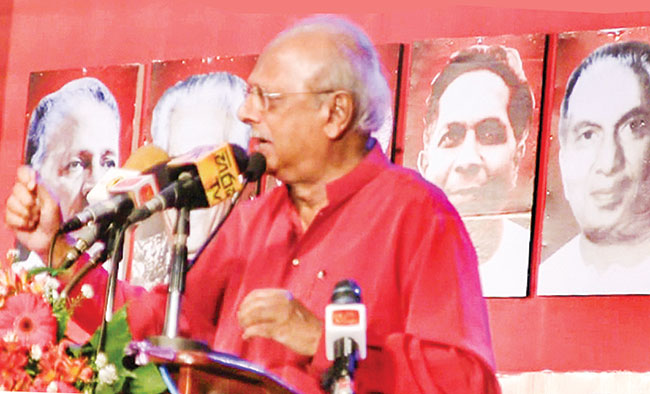
Says its focused on small section of capitalist class
Little support for small traders and SMEs
No program for overall development of agriculture sector
Expolitation of farmers continues without any govt. support
Opposition to Yugadanavi deal welcomed
The Lanka Sama Samaja Party (LSSP), which was formed on the December 18, 1935, celebrates its 86th Anniversary on December 17 at party headquarters. The theme is “development towards elimination of poverty and for social justice” party leader Tissa Vitarana said in a news release critical of the budget 2022..
“There must be a well thought out plan to face and overcome the economic crisis, as well as the health problems, Covid-19 and hunger. While supporting the proposal to have a development oriented budget, it would appear to be one that is focused to a small section of the capitalist class but did not cover the overall economy.
“For instance there was little support for the small traders and the SME’s. It was disappointing to note that there was no programme for overall development of the agricultural sector. This includes ensuring the production and supply of adequate fertilizer.
“The exploitation of the farmer continues without any Government support through purchasing and marketing provisions like the marketing department. The high prices of foods are mainly due to exploitation by mill owners and traders. Strengthening of the producer and consumer cooperatives would eliminate the profiteering by middlemen.”
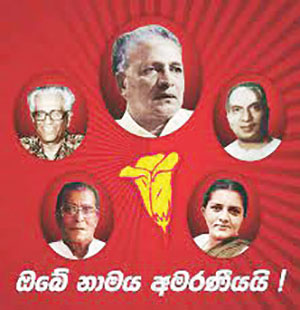 But he qualified: “Besides self-sufficiency in food, the decision by Government to promote local value added industry is welcome. The foundation laid by the Ministry of Science and Technology to do this through the Vidatha movement at the SME level and SLINTEC and SLIBTEC at the hi-tech level need to be further intensified. Sri Lanka must become an industrialized country. “
But he qualified: “Besides self-sufficiency in food, the decision by Government to promote local value added industry is welcome. The foundation laid by the Ministry of Science and Technology to do this through the Vidatha movement at the SME level and SLINTEC and SLIBTEC at the hi-tech level need to be further intensified. Sri Lanka must become an industrialized country. “
He urged that the threat from American led imperialism continues and must be opposed. It is focused on getting control of our economy through the MCC agreement and to establish a military base on the basis of the SOFA agreement.
“The resounding defeat of the UNP and its allies by the people at the last general election with the victory of the SLPP, prevented the signing of these two dangerous agreements. But these efforts of the USA are continuing, and the people led by the progressive forces in the Government and outside must counter all such efforts,” he said.
“The resistance to the 40% share in the Yugadanavi project being given away, with its danger of the USA controlling our power generation is welcome. Sri Lanka must stick to the principle that national assets should nor be sold to foreigners, and the drive for self-sufficiency must be intensified.
“The LSSP urges all progressive and nationalist forces to intensify the struggle against these moves by the USA and its allies, both foreign and local. However this should not prevent us from getting help from friendly countries like India, China and Cuba which are not imperialist and are focused on increasing trade for mutual benefit. But we welcome genuine help from all countries, even the USA.”
The statement continued:
“The problem of poverty continues, with 60% of families in Sri Lanka living below the poverty line. The problems of unemployment and under employment continue seriously affecting their incomes and purchasing power even of essentials. Along with rising high prices and with no effort on the part of the Government to reduce this by strengthening the Cooperative movement, both wholesale and retail, the people live in hunger with some having only one meal a day.
“The malnutrition level has increased to 18%, which means that one of five children are ill, and the others are also affected to some extent. This has an adverse effect on their growth not only of the body but also of the mind. If this continues the future generation will tend to be stunted, thin and with lower mental capacity.
“In my opinion the Government should give priority to the provision of adequate food and other essentials to all citizens. The development effort (highways etc.), can be delayed. The Government must make a proper assessment of those living in hunger and the supply of free dry rations weekly should be instituted.
“It is good that the drive to control the Covid-19 pandemic, where the Government has actively intervened by its immunization programme is welcome, though we have some reservations about the safety of the Pfizer and other mRNA vaccines. The onus is now on the people to comply with the preventive health regulations (wearing of masks, social distancing, frequent hand washing with soap and water and avoiding crowds). Where this is not being observed the Government needs to enforce it, setting up specialized covid control committees where necessary.
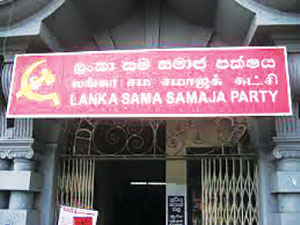 “Thus the LSSP is continuing its anti-imperialist and anti-big capitalist policies to solve the problems of the people. It is necessary to go in a socialist directions by strengthening state participation in the agricultural, industrial and marketing sectors of the economy. In addition the move towards a ‘Solidarity Economy’ should be intensified. All loss making institutions both public and private, should be run on solidarity principles.
“Thus the LSSP is continuing its anti-imperialist and anti-big capitalist policies to solve the problems of the people. It is necessary to go in a socialist directions by strengthening state participation in the agricultural, industrial and marketing sectors of the economy. In addition the move towards a ‘Solidarity Economy’ should be intensified. All loss making institutions both public and private, should be run on solidarity principles.
“This means that they should be functions as companies (e.g. 30 years lease where Government land is used), which are owned solely by the employees of that institutions. This will not only give them a sense of ownership leading to greater commitment to improve the performance of the institutions, but also ensure that they get an equal share of the profit.
“The Workers Administrative Council will select professional management and technical personnel purely on merit. This proposal is no ideal dream. It is being practiced in several countries abroad, even in Europe. For instance in Kerala state, India where TATA’s claimed that they were running the tea estates (63,000 hectares) at a loss, the left Government took the land back and ran them on the solidarity principle. “
Not only have they become large profit making concerns but also generated a greater enthusiasm among the workers who have got a share of the profit in addition to their regular salary. All stealing and misconduct has ended as they have a sense of ownership. The LSSP demands that this policy be implemented not only in the plantation sector but in all public and private institutions, specially where they are running at a loss. This would increase productivity and also help in the transition to socialism.”
Vitarana continued: “It was the LSSP that led the independence struggle against imperialism and poverty in Sri Lanka from 1935. It built up a strong trade union movement to win the worker’s rights. It led the struggle against poverty by establishing a social welfare state. The leadership were given by Dr.N.M.Perera, Dr.Covin R.de Silva, Leslie Goonewardene, Bernard Soysa and others. “
This struggle must continue on the lines mentioned above for the development of the country in the interest of its entire people, irrespective of community differences, as one united Sri Lankan nation. The struggle in and out of jail for independence and people’s rights that our founder leaders started must be continued in the direction of Socialism.”
News
Breakaway JVP faction decries Indo-Lanka MoUs as betrayal

… alleges Kanchana’s Electricity Act exploited to facilitate ‘deal’ with India
The Frontline Socialist Party (FSP) has alleged that President Anura Kumara Dissanayake entered into seven MoUs/Agreements with India without consulting Parliament or the Cabinet of Ministers.
Accusing President Anura Kumara Dissanayake, who is the leader of the Janatha Vimukthi Peramuna (JVP), as well as the National People’s Power (NPP), of undermining Sri Lanka’s sovereignty, the breakaway JVP faction pointed out the signing of seven MoUs/Agreements had coincided with the 54th anniversary of the JVP’s first insurrection.
The top FSP spokesman and their Education Secretary, Pubudu Jayagoda, told a press conference, at their Nugegoda party office, that the JVP had completely betrayed those who sacrificed their lives during the 1971 and 1987-1990 insurrections. Having completely changed its policy towards India, the JVP was now down on its knees before India, Jayagoda said.
The dissident JVPer emphasised that such vital MoUs/Agreements couldn’t be finalised without proper consultations. Declaring that the MoUs/Agreements hadn’t been released yet, Jayagoda said that the FSP, in terms of the Right to Information Act, sought the copies of them as the public couldn’t be deprived of their right to know.
The section, now calling themselves FSP, split from the JVP in early 2012 after major differences among the top leadership over the direction of the party. Anura Kumara Dissanayake succeeded Somawansa Amarasinghe as the JVP leader in Dec. 2014.
Referring to the MoU, in respect of the implementation of HVDC interconnection for import/export of power, Jayagoda said that the NPP took advantage of the new Electricity Act that was enforced by the Wickremesinghe-Rajapaksa government in late June last year to pave the way for a deal with India. The JVP-led NPP that moved court against the then Power Minister Kanchana Wijesekera’s Bill, and voted against the Bill at the second reading, exploited the same to its advantage, Jayagoda charged.
The Sri Lanka Electricity Bill repealed the 1969 Ceylon Electricity Board (CEB) Act and subsequent laws regarding the electricity industry.
Comparing the MoU, signed in the presence of President Dissanayake and Premier Narendra Modi, Jayagoda said that both Nepal and Bangladesh had been trapped in similar agreements they signed earlier.
Jayagoda alleged that Nepal was in such a pathetic situation even if they could meet electricity requirement through hydro-power generation, the agreement with India compelled them to obtain power from India.
Jayagoda pointed out that the government now boasted of a proposed new120 MW solar power plant at Sampur to be implemented in two stages after having crippled domestic solar power generation capacity. The former JVPer said that the NPP government was bending backwards to appease India and pursuing an agenda inimical to Sri Lanka.
Jayagoda dealt with the MoU on cooperation in the field of sharing successful digital solutions implemented at population scale for digital transformation. The FSP spokesman said that the Indian-funded project to issue digital NIC would be disastrous as it would enable India to gather information.
Commenting on a MoU that covered the health sector, Jayagoda alleged that the government had agreed to share authority exercised by the National Medicine Regulatory Authority (NMRA) with India.
Jayagoda said that the MoU on defence cooperation undermined the country’s vital security interests and jeopardised relations with other countries.
The FSP said that political parties, represented in Parliament, were largely silent and seemed to be reluctant at least to express their views on the betrayal of the country.
By Shamindra Ferdinando
News
Adani’s Colombo Terminal commences operations
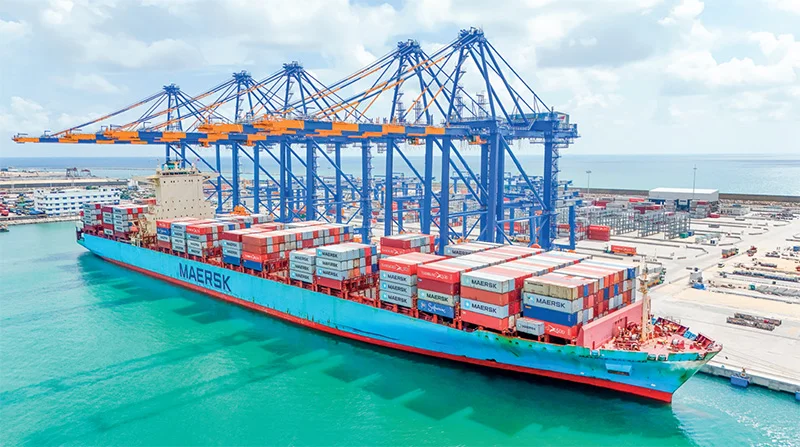
Adani Ports and Special Economic Zone Ltd. (APSEZ), India’s largest integrated transport utility, has announced the commencement of operations at the Colombo West International Terminal (CWIT), located at the Port of Colombo, the company said in a statement issued simultaneously in Ahmedabad and Colombo yesterday (07)
Developed under a landmark public–private partnership, CWIT is operated by a consortium comprising India’s largest port operator Adani Ports & SEZ Ltd., leading Sri Lankan conglomerate John Keells Holdings PLC, and the Sri Lanka Ports Authority, under a 35-year Build, Operate, and Transfer (BOT) agreement.
The CWIT project represents a significant investment of USD 800 million and features a 1,400-metre long quay and 20-metre depth, enabling the terminal to handle approximately 3.2 million Twenty-foot Equivalent Units (TEUs) annually. It is the first deep-water terminal in Colombo to be fully automated, designed to enhance cargo handling capabilities, improve vessel turnaround times and elevate the port’s status as a key transshipment hub in South Asia.
Construction began in early 2022 and has since achieved rapid progress. With the installation of cutting-edge infrastructure now nearing completion, CWIT is poised to set new benchmarks in operational efficiency and reliability in regional maritime logistics.
“The commencement of operations at CWIT marks a momentous milestone in regional cooperation between India and Sri Lanka,” said Chairman of the Adani Group Gautam Adani. “Not only does this terminal represent the future of trade in the Indian Ocean but its opening is also a proud moment for Sri Lanka, placing it firmly on the global maritime map. The CWIT project will create thousands of direct and indirect jobs locally and unlock immense economic value for the island nation. It also stands as a shining example of the deep-rooted friendship and growing strategic ties between the two neighbours, and of what can be achieved through visionary public–private partnerships. Delivering this world-class facility in record time also reflects the Adani Group’s proven ability to efficiently execute large-scale critical infrastructure projects anywhere in the world.”
“We are proud to see the progress in the development of the West Container Terminal, a project that strengthens Sri Lanka’s position as a regional maritime hub,” said Chairperson, John Keells Group Krishan Balendra. “This project is one of the John Keells Group’s largest investments and is among the most significant private-sector investments in Sri Lanka. Together with the Sri Lanka Ports Authority and the Adani Group, we will elevate Colombo’s status as a leading transshipment hub. We are confident that the project will enhance global trade and connectivity in the region”, he said.
News
SLIC Life reports robust performance with Rs. 30.7 Billion PBT in 2024
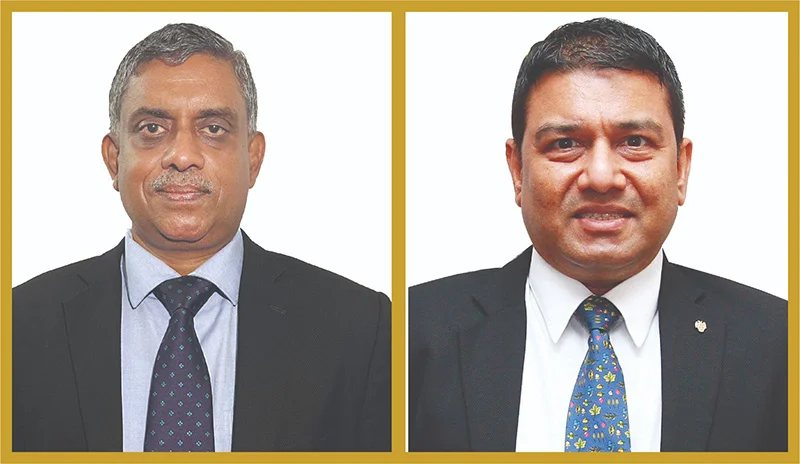
Sri Lanka Insurance Corporation Life Limited (SLICLL) has concluded the year 2024 with outstanding financial performance, achieving a remarkable profit before taxation of Rs. 30.7 billion. The text of SLIC statement: “The company recorded a robust Gross Written Premium (GWP) of Rs. 26.3 billion, reflecting an impressive 25% growth. Remarkably, as of December 31, 2024, Sri Lanka Insurance Life marked a historic milestone with a New Business volume of Rs. 5.3 billion, recording a 48% growth, the highest in the company’s history.
Demonstrating its unwavering commitment to policyholders, Sri Lanka Insurance Life disbursed Rs. 13.7 billion in maturity settlements and claim payments in 2024, these figures reaffirm the company’s financial strength and dedication to fulfilling its obligations. Further cementing its position as a market leader, SLICLL continued to expand its asset base to an impressive Rs. 237 billion and grew its Life Fund to Rs. 213.2 billion. These achievements were realised amidst organizational transformations and challenging economic conditions. Additionally, the company recorded 319 MDRT qualifiers, the highest ever for SLIC Life.
Highlighting its prudent investment strategies and unwavering commitment to policyholders, Sri Lanka Insurance Life declared the largest Life Insurance bonus in the industry for 2023, amounting to Rs. 11.2 billion. Over the past two decades, the company has consistently delivered industry-leading bonus payouts, with cumulative declarations exceeding Rs. 104 billion. Continuing this legacy, Sri Lanka Insurance Life is set to declare its highest ever bonus for 2024, with official communication to be released in the near future.
Group Chief Executive Officer of Sri Lanka Insurance, Mr. Chandana L. Aluthgama, stated, “Our exceptional financial performance is a testament to the dedication and resilience of our team, who have navigated challenges with unwavering commitment. Despite economic fluctuations and internal transformations, our strategic focus has reinforced our market leadership. As we step into the future, we remain committed to innovation, customer trust, and industry leadership.”
Chairman of Sri Lanka Insurance, Mr. Nusith Kumaratunga, emphasized, “Sri Lanka Insurance Life has proven its strength and stability, delivering sustainable growth while reinforcing its role in the nation’s economic progress. Our vision extends beyond business success, we aim to contribute to national development by strengthening the economy and reducing dependency of the people on state support.”
Beyond financial success, Sri Lanka Insurance Life continued to earn industry recognition in 2024. The company was named ‘The Most Loved Life Insurance Brand’ by LMD for the seventh consecutive year and was ranked among the ‘Top 100 Most Valuable Brands’ in Sri Lanka by LMD Brand Finance. Additionally, SLIC Life secured top honors at the ‘Best Management Practices Company Awards 2024,’ ranking among the top ten companies and winning the ‘Insurance – Public Sector Company’ category.
Committed to international standards and operational excellence, Sri Lanka Insurance Life maintains ISO 9001:2015, ISO/IEC 27001:2013, and ISO 14064-1:2018 certifications. The company also continues its social impact initiatives, including the free Life Insurance cover gifted to parents of newborns on World Children’s Day for the third consecutive year, supported 1100 families in flood affected areas, providing emergency assistance to pilgrims traveling to Anuradhapura for Poson Poya and the awarding of 370 Suba Pathum scholarships to outstanding students in national examinations.
Looking ahead, Sri Lanka Insurance Life remains focused on driving innovation, enhancing customer confidence, and making meaningful contributions to society. With a solid foundation and a clear vision, the company is poised to maintain its legacy of excellence and leadership in the insurance industry.
.
-

 Business1 day ago
Business1 day agoColombo Coffee wins coveted management awards
-

 Features2 days ago
Features2 days agoStarlink in the Global South
-

 Business3 days ago
Business3 days agoDaraz Sri Lanka ushers in the New Year with 4.4 Avurudu Wasi Pro Max – Sri Lanka’s biggest online Avurudu sale
-

 Business4 days ago
Business4 days agoStrengthening SDG integration into provincial planning and development process
-

 Business3 days ago
Business3 days agoNew SL Sovereign Bonds win foreign investor confidence
-

 Sports5 days ago
Sports5 days agoTo play or not to play is Richmond’s decision
-

 Features2 days ago
Features2 days agoModi’s Sri Lanka Sojourn
-

 Sports4 days ago
Sports4 days agoNew Zealand under 85kg rugby team set for historic tour of Sri Lanka











